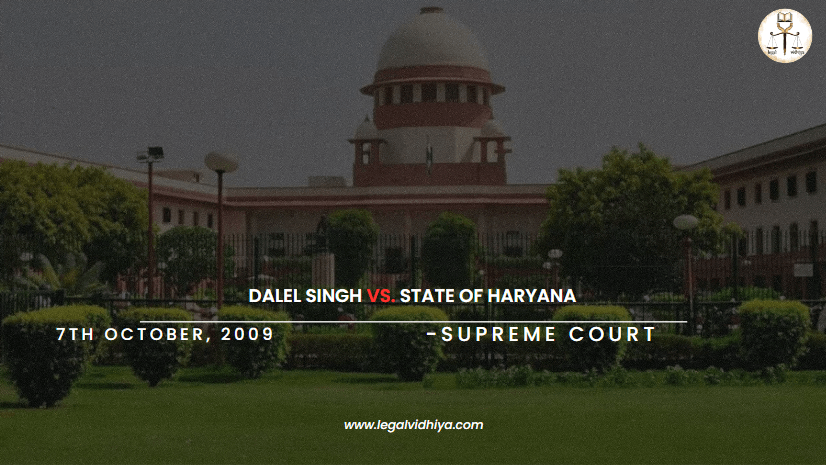
| CITATION | (2010) 1 SCC 149 |
| DATE OF JUDGMENT | 7th October, 2009 |
| COURT | The Supreme Court of India |
| APPELLANT | Dalel Singh |
| RESPONDENT | State of Haryana |
| BENCH | V.S. Sirpurkar and Deepak Verma, JJ. |
INTRODUCTION:
The case of Dalel Singh Vs. State of Haryana involved an appeal by the appellant-accused against his conviction under Section 20 of the Narcotic Drugs and Psychotropic Substances Act, 1985 (NDPS Act). The appellant was sentenced to rigorous imprisonment for 10 years and a fine of Rs. 1.5 lakhs. The prosecution’s case revolved around the discovery of 6.5 kilograms of charas in the appellant’s house, leading to his arrest and subsequent trial.
During the proceedings, the defense raised concerns regarding the alleged non-compliance with Section 42 of the NDPS Act, discrepancies in the evidence presented, and ownership of the premises where the contraband was seized. The prosecution, on the other hand, presented evidence to establish the appellant’s guilt and argued for the conviction under the NDPS Act.
The case was heard by the Supreme Court of India, where the judges considered the arguments put forth by both parties, referenced relevant judgments, and ultimately arrived at a decision. The court’s judgment addressed the issues raised during the trial and concluded with the dismissal of the appeal, affirming the conviction of the appellant-accused.
FACTS:
In the case of Dalel Singh Vs. State of Haryana, the prosecution story revolved around the discovery of 6.5 kilograms of charas in a plastic bag in the courtyard of the appellant-accused’s house. Inspector Mahabir Singh, along with other police officials, received a secret tip that the accused was involved in selling charas and storing it in his house. The police party, including witnesses Surajbhan, Namberdar, and Chanderbhan, conducted a search of the accused’s house after obtaining the key from his wife. The charas was found in a fodder room inside the “gher” (compound) of the house. Samples were collected, and a report was sent to the concerned police station to register a first information report.
The appellant-accused was convicted under the NDPS Act for the possession of charas.
The appellant was represented by Mr. Ratan Kumar Choudhary, while the State of Haryana was represented by a counsel who remained absent during the hearing.
ISSUES RAISED:
Whether there was compliance with the requirements of Section 42 of the NDPS Act, particularly regarding the recording of information and informing the superior officer before taking action?
The question of ownership of the house from where the contraband charas was seized, with a focus on whether there was sufficient evidence to establish ownership.
CONTENTIONS RAISED BY THE DEFENCE
The defence argued that there was total non-compliance with the provision of Section 42 of the NDPS Act, emphasizing the failure to record information before the raid or inform the superior officer thereafter. It was asserted that this non-compliance was a breach of a mandatory provision of the Act and fatal to the prosecution’s case. Additionally, discrepancies in the weight of the recovered charas as stated by different witnesses were highlighted as a point of contention.
CONTENTIONS BY THE PROSECUTION
The prosecution presented evidence to establish the discovery of 6.5 kilograms of charas in the accused’s house. They argued that the contraband was found in the possession of the accused and that the necessary procedures, such as sample collection and documentation, were followed. The prosecution contended that the evidence supported the conviction of the appellant-accused under the NDPS Act.
JUDGEMENT:
The court referred to the judgment in Karnail Singh v. State of Haryana, where it was held that literal compliance with the requirements of Sections 42(1) and 42(2) of the NDPS Act was not necessary. The court emphasized the importance of recording information and sending it to the superior officer but noted that strict literal compliance was not always required.
The court acknowledged the discrepancies in the evidence regarding the weight of the recovered charas but ultimately found that the contraband was indeed found in the accused’s possession. The court noted that the ownership of the house where the charas was seized was accepted by both lower courts, and the recovery of 6.5 kilograms of charas was established through proper documentation and procedures.
Based on these considerations, the court dismissed the appeal, stating that there was no merit in the contentions raised by the appellant. The appellant was directed to surrender to serve the remaining sentence.
CONCLUSION:
In conclusion, the case of Dalel Singh Vs. State of Haryana involved issues related to compliance with Section 42 of the NDPS Act, discrepancies in evidence, and ownership of the premises where contraband was seized. The court considered the arguments presented by both parties and referenced relevant judgments to make its decision.
Ultimately, the court dismissed the appeal, finding no merit in the contentions raised by the appellant. The court upheld the conviction of the appellant-accused under the NDPS Act and directed the appellant to surrender to serve the remaining sentence. The court appreciated the efforts of the appellant’s counsel during the hearing of the matter.
REFERENCE
- Manupatra
- https://indiankanoon.org
This Article is written by Ramendra Singh student of CPJ CHS & SoL, GGSIPU; Intern at Legal Vidhiya.
Disclaimer: The materials provided herein are intended solely for informational purposes. Accessing or using the site or the materials does not establish an attorney-client relationship. The information presented on this site is not to be construed as legal or professional advice, and it should not be relied upon for such purposes or used as a substitute for advice from a licensed attorney in your state. Additionally, the viewpoint presented by the author is of a personal nature.




0 Comments